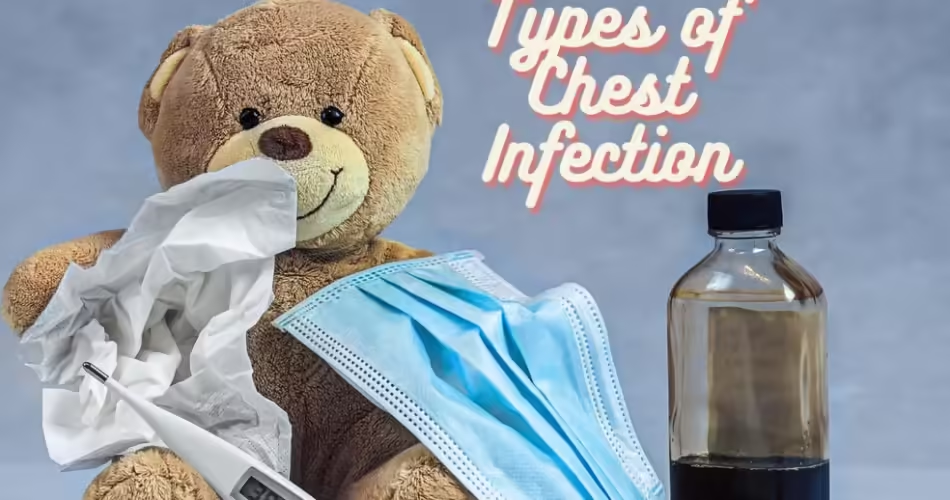This blog contains information about Chest Infections. It starts with defining and introducing Chest Infections. Then it mentions the main Causes of Chest Infections. It also elaborates the main Symptoms of Chest infections. Then it mentions the Types of Chest infection in detail. It also explains the Treatment of Chest infections. In the end, it explains the Preventive Measures for Chest Infections so this blog contains Causes, Symptoms, Types, Treatment and Prevention of Chest Infections.
What is Chest Infection?
Chest Infection is the infection that effects your lungs, either in the larger airways or smaller air sac. It cause production of pus and fluid (mucous) and air-ways becomes swollen making it difficult for the patient to breathe.
Chest infection can be exposed to people of all ages, ranging from small babies to old people so young children and old people are at risk of getting chest infection at most.
Chest infection is a very severe infection as it makes a person weak and also cause difficulty in normal breathing mechanism. This cause extreme discomfort and congestion.
Chest infection like all other infections can be treated with antibiotics and proper rest. It should be treated without delay because its symptoms and severity multiplies with time by increasing the amount of mucous in your lungs and cause blockage.
Causes of Chest Infection:
As we know that Chest Infection is caused by any virus and bacteria. But it can also be caused by Mycoplasma. Mycoplasma is a different type of bacteria that can cause infection in any part of the body so it lack cell wall around their cell membrane. Mostly virus, bacteria and also Mycoplasma are the causes of Chest infection. The activities that may become the cause of Chest Infection are as follows:
- Smoking
- Alcohol Abuse
- Being Underweight
- Poor Dental Hygiene
- Respiratory disease conditions
- Cardiovascular disease conditions
- All these activities may lead to Chest infection in Patients.
Symptoms of Chest Infection:
Symptoms of Chest Infection includes:
- Fast and difficult Breathing
- Severe coughing with green or brown phlegm
- Fever
- Feeling unwell
- Stomach pain
- Chest pain
- Headache
- General aches and pains
- Loss of appetite
In case of children, they can have vomiting, diarrhea, be irritable or allergic. All these symptoms indicates exposure of Chest Infection.

Types of Chest Infection:
There are many types of Chest Infection, some most common types are as follows:
Bronchitis:
Bronchi are the major airways to the lungs so any infection caused in the bronchi is called as Bronchitis. Severe Flu and cold are the major causes of Bronchitis. Sometimes, bacterial infections can also cause Acute Bronchitis. Airways are irritated, your immune system causes the body to swell up and there is difficulty in breathing.
It symptoms includes, fever, runny nose, fatigue, shortness of breathe and many other chronic symptoms.
Pneumonia:
Pneumonia effects the air sacs or alveoli of the lungs so it is the condition in which air sacs are filled with pus or fluid. It can effect people of all ages. This is a common infection in the world. It directly effects the breathing of the patient and so continuously cause pressure on the lungs.
Its symptoms includes, shortness of breathe, rapid shallow breathing, low energy, loss of appetite and many other symptoms.
Tuberculosis:
Tuberculosis cause severe bloody coughing and so it can be transmitted in the form of body fluids and droplets. People with HIV and AIDS are likely to be exposed to Tuberculosis. It expose to the patients with weaker immunity and when immunity attack itself (autoimmunity).
Its symptoms includes, fever, chills, night sweats, weight loss, tiredness, pain with breathing and so many different symptoms.
Treatment of Chest Infection:
Following are the Treatments for Chest Infection:
Get plenty of Rest:
All the respiratory diseases recovers by taking plenty of rest. With rest, all the treatments and medications will work out with speed and make you healthy very soon. Plenty of sleep is also necessary for its cure.
Antibiotics and Pain Killers:
Antibiotics are must for treating any infection. Doctors prescribe them according to the requirement of the patient and patient’s medical history.
We use painkillers to reduce pain in muscles due to constant coughing, avoid body pain, throat pain and headache.
Other activities that can help to recover from chest infection, are as follows:
- Drinking a lot of water can activate speedy recovery.
- Sleeping should be on elevated pillows to avoid difficulty in breathing. It also helps to clear the mucous.
- Drink hot water with lemon and honey to heal the throat and reduce pain in throat
- Avoid drinking cold drinks and cold water. etc.
- Flu vaccine can help to fight with Chest infection.
This blog contains Types, Causes and Treatment of Chest Infections.

Remedies for Chest Infection
Prevention from Chest Infection:
There are following preventive measures to avoid Chest infection and to avoid spread of chest infection:
How to avoid Chest Infection?
Getting Flu Vaccine every year.
Quit smoking
Avoid Alcohol abuse etc.
How to avoid spread of Chest Infection?
Wear a mask if you go out of your house.
Wash your hands properly several times a day.
Throw away used tissues immediately.
Avoid shaking hands and also contact with people.
Stay at home and take rest.
Conclusion:
Chest infections are the infections of the lungs that cause swollen lungs filled with mucous and pus. Chest Infection may effect the smaller air sacs or larger air sacs of the lungs so this condition cause difficulty in breathing and cause severe cough with green or brown phlegm. Its cause may be bacteria, virus or mycoplasma so its major types are Bronchitis, Pneumonia and Tuberculosis. It is very important to take rest in order to recover from chest infection. Its spread is very fast, so the person should avoid contact with people and try to stay at home and take rest until you get complete cure. This blog contains Causes, Types, Treatment and Prevention of Chest Infections.
To learn about more diseases, click the links below:


Comments